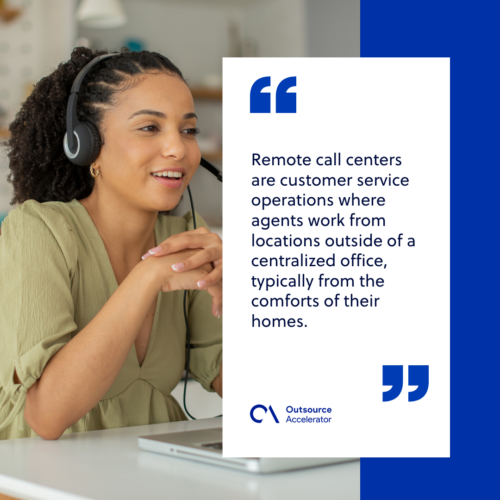Remote call centers: Embracing efficiency and flexibility

Call centers are instrumental in delivering exceptional customer service and support for businesses across various industries.
However, traditional call centers often face numerous challenges, including high operational costs, limited scalability, and difficulties in recruiting and retaining talented agents.
Many companies are opting for remote call centers as a practical remedy to address these challenges.
In the 487th episode of the Outsource Accelerator Podcast, Claas van Delden, yoummday’s Chief Growth Officer, explains how the company’s remote freelance model offers multinational businesses cost savings with its global talent pool.
Understanding remote call centers
Remote call centers are customer service operations where agents work from locations outside of a centralized office, typically from the comforts of their homes. They handle incoming and outgoing calls and provide support to customers using telecommunication and digital tools.
This unique concept of a call center work model is what yoummday is known for. Claas describes the platform as “The Airbnb of call centers” – connecting clients to seasoned freelance agents worldwide. “Although we’re working with freelancers, we are not gig. I think that’s an important differentiation to make because the work we provide is regular, fully trained, permanent, high-quality work.”
How remote call centers work
Remote call centers function similarly to traditional call centers, but the key difference is that employees work from different locations.
Here’s how they typically function:
Recruitment and hiring
Companies recruit and hire remote call center agents through various channels, such as:
- Online job boards
- Recruitment agencies
- Employee referrals
Candidates go through a standard hiring process through the yoummday platform, which includes interviews, assessments, and background checks.
Training and onboarding
Once hired, remote call center agents undergo training and onboarding sessions to familiarize themselves with the client’s products, services, policies, and procedures.
Training may be conducted remotely through video conferences, webinars, online modules, or virtual classrooms.
According to Claas, “We train our talents in anything from two days for very simple tasks to eight weeks for very complex tasks, in which they have to work on a number of client systems and all of that.”
Work schedule and shifts
Remote call center agents are assigned shifts or schedules during which they are expected to be available to handle customer inquiries, issues, or requests.
Shifts may vary depending on the company’s operating hours and customer demand, and agents may have the flexibility to choose their preferred shifts within certain parameters.
As for yoummday, “From a talent perspective, they get to choose who they want to work for. They get to choose their shift times when they want to work.”
Claas adds, “On average, our talents are working between 20 and 25 hours, [but] that’s productive time per week.”
Handling calls
Agents use their designated software or tools to receive incoming calls, make outbound calls, and interact with customers via phone, email, chat, or other communication channels.
They follow predefined scripts or guidelines to provide accurate and consistent responses to customer inquiries, resolve issues, and deliver high-quality customer service.Performance monitoring and management
Supervisors or team leaders monitor the performance of remote call center agents through various metrics such as:
- Call volume
- Call duration
- Customer satisfaction scores
- Adherence to company policies
They provide feedback, coaching, and support to help agents improve their performance and meet their targets.
Communication and collaboration
Remote call center agents stay connected with their colleagues, supervisors, and support teams through virtual communication and collaboration tools like:
- Instant messaging
- Video conferencing
- Collaboration platforms
This enables seamless communication, coordination, and teamwork despite physical distance.
Security and compliance
Companies implement security measures and protocols to ensure the confidentiality, integrity, and privacy of customer data and sensitive information handled by remote call center agents.
The firm takes pride in its certifications. “We’re ISO certified, ISO 9000, ISO 27001. We do have PCI compliance.” yoummday agents are also trained on data security best practices and are required to adhere to compliance regulations and industry standards.
Advantages of working with a remote call center
Remote call centers have gained significant traction in recent years due to advancements in technology and the changing dynamics of work environments.

Below, we have the benefits they provide to growing businesses around the world:
- Flexibility. Agents can work from anywhere with an internet connection, which allows them to be flexible in scheduling and accommodate various time zones.
- Cost savings. Since yoummday works with freelancers, “they get paid when they perform work. So, clients don’t have to pay for capacity, but they pay for output and performance,” Claas explains.
- Access to a larger talent pool. Remote call centers can recruit agents from a wider geographical area, allowing for access to a diverse talent pool with varied skill sets and language capabilities.
- Improved agent satisfaction and retention. Agents appreciate the flexibility and autonomy that comes with remote work, leading to higher job satisfaction and potentially lower turnover rates.
- Enhanced productivity and efficiency. Remote work eliminates distractions commonly found in traditional office environments. Agents can focus on their tasks and handle calls more efficiently.
- Environmental impact. Remote call centers align with sustainability initiatives and corporate social responsibility goals by promoting telecommuting and reducing the need for physical infrastructure.
- Scalability and agility. Remote call centers can quickly adapt to changing business needs and market demands by adjusting agent capacity and reallocating resources as required.
These advantages collectively make remote call centers an attractive option for businesses seeking cost-effective, scalable, and flexible customer service solutions in today’s digital age.
Navigating the future with remote call centers
Remote call centers offer businesses a pathway to adaptability, efficiency, and resilience in an ever-evolving global market.
Embracing the advantages of remote work not only enhances operational flexibility and cost-effectiveness but also fosters a happier, more diverse workforce.
yoummday’s Chief Growth Officer ends the podcast with a strong remark: “We very much believe in the quality of our talent pool and what they can do for end customers.”
As technology continues to advance and remote work becomes increasingly prevalent, businesses that leverage a virtual call center stand poised to thrive in the dynamic industries of tomorrow.








 Independent
Independent




